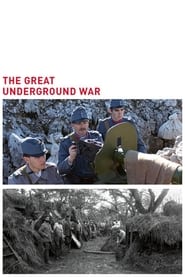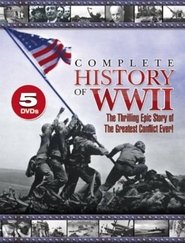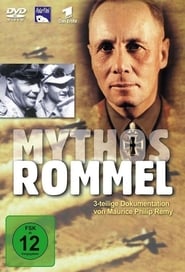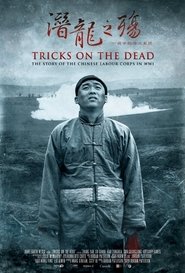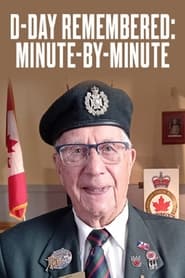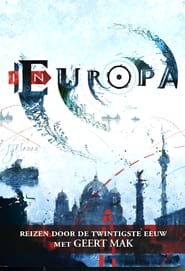Popular War Politics TV Series - Page 123
-
American Mercenaries: Killing in Yemen
2024
star 8BBC Arabic's Nawal Al-Maghafi reveals how the UAE hired mercenaries to conduct targeted assassinations of its political enemies in Yemen, with American mercenaries starting the killings in 2015. -
Пилигрим
2024
-
Die Gestapo
2004
Die Gestapo
2004
-
The Great Underground War
2014
A five-part series that explores the forgotten story of the incredible engineering feats and secret survival techniques of five legendary battles fought underground during World War I. -
U-Boats Hitler's Sharks
2009
From the beginning of the Second World War the sea became a vitally important scene of conflict. Great Britain relied on receiving supplies by sea and, therefore, a total blockade of the United Kingdom was one the main objectives of Hitler's Germany. The British government was forced to maintain a strategy of antisubmarine warfare throughout the conflict, while the Royal Navy sought to interrupt the Third Reich's maritime traffic. In these circumstances the submarine became an important weapon of war. Headed by Karl D nitz, who would later succeed Hitler as Head of State, the German U-boats gained the initiative in the sea war and from the beginning launched all-out attacks against shipping en route to Great Britain. One of the great unanswered questions of the war is what would have happened if Hitler had granted the numerous requests made by D nitz for more submarines? -
Als der Krieg nach Deutschland kam
2006
When American troops started their final invasion of Nazi Germany in February 1945, cameramen were at their side and complied over a thousand reels covering 12 weeks in Germany until the ultimate collapse of the Third Reich including stories on the road from the Bulge over the Remagen Bridge to the Eagle’s Nest. Michael Kloft has selected the most striking scenes for his two-part documentary. -
Sharon
2021
Sharon
2021
Follows Sharon's term as PM from the moment he was elected. The series goes through his leadership under mass terror attacks, his willingness to support the two-state solution, his decision to start Operation Defensive Shield in 2002, his demand from the Palestinians to replace Yasser Arafat as a condition for all negotiations, the establishment of the separation fence, and the disengagement from Gaza that turned his greatest supporters into sworn enemies. In addition, the series returns to selected chapters in Sharon's life as a child in Kfar Malal, as a family person, as a soldier and as minister in Israeli governments. Among the interviewees: Gilad Sharon, Dov Weissglas, Eyal Bronze, Uri Monday, Moshe Kaplinsky, Israel Maymon, Assi Yavni, Tzipi Livni, Gideon Saar and Aria Eldad. -
Battlezone WWII: The U.S. Army Air Forces
2015
This Battlezone series features an in-depth analysis of the evolution of the U.S. Army Air Forces and its role in combat. -
Возвращение
0000
Возвращение
0000
-
Battlezone WWII: Dunkirk and the Battle for Britain
2015
This Battlezone series looks at Dunkirk and the early days of WWII, leading up to the Battle of Britain and supremacy in the skies. -
The Brave Men of Tangestan
1975
England attacked south of Iran on the pretext of the siege, by Ahmed Ristini, the Syrian, and, with the exception of the titular, the strong prince of the lye, in defence of Persia and the British are cut down to defend the people of England, who attack from land and water to the south, Ali de la Chevreuse, and who robbed the poor and the poor. -
Complete History of WWII
2003
The complete history of World War II traces the monumental story of the greatest conflict of the 1900s. This series details many of the key moments of WWII: Appeasment of Munich, Blitzkrieg, the fall of France, the London Blitz, Rommel and the Africa Corps, the war in the Pacific, Stalingrad, D-Day, the Battle of the Bulge, Midway, and so much more. -
The Rommel Myth
2002
The Rommel Myth
2002
In 2002, Munich born Maurice Philip Remy produced a three-part documentary film, Mythos Rommel ('The Rommel Myth'), for German TV with a book of the same name, chipping away at the Rommel legend dramatically. In the manner of Jeremy Isaacs' award-winning World at War series of 1973, Remy's exhaustive 'Mythos Rommel', later released with with an english-language soundtrack, relies on much pre-war and wartime newsreel footage of Rommel, skillfully weaving in interviews with surviving members of the Field Marshal's staff including Heinz Werner Schmidt; his nurse in North Africa; soldiers who fought for and against him, including Field Marshal Lord Carver; one of Churchill's former secretaries; the unrelated but intriguingly named Italian soldier Mario Rommel and both his grandson and granddaughter Helen and Joseph Pan, and Erwin's son Manfred also are making important contributions. Field Marshall Erwin Rommel was the most famous and celebrated German military commander of the Second World War. He was revered by the -
Big in Korea
2025
Big in Korea
2025
-
林海雪原
2004
林海雪原
2004
-
Battlezone WWII: Nazi Raiders in the Atlantic
2015
This Battlezone series features the Battle of the Atlantic to secure the allied supply chain. -
D-Day Remembered: Minute by Minute
2021
On 6th June 1944, 156,000 men took part in D-Day, the largest amphibious invasion in history. Its aim: to land in France and liberate Europe from four years of Nazi domination. In this series, the first 24 crucial hours of this incredible story is told — minute by minute — by the last surviving men who witnessed the horrors and victory unfold. Diaries and stories, told by those left behind, recount the personal experience of the men who were there. It was a day that not only changed their lives, but changed the course of the Second World War. -
In Europa
2007
In Europa
2007
In Europa is a series of television documentaries on Europe in the 20th century, based on the book with the same name by Dutch writer and historian Geert Mak. The series had a budget of 4 million euro and was cofinanced by the Dutch Ministry of Interior Relations. Episodes are available for viewing on the official site. First broadcast on Nederland 2 from 2007 to 2009, quite a few locations important in European history are shown throughout the series, both historical and current. After two episodes the Flemish public channel bought the series, starting broadcasts on January 8, 2008. Swedish public channel Sveriges Television bought the series as well, starting broadcasts from January 2009. Croatian public television also bought the series and begun broadcasting from late 2011 through 2012. Although the series is mainly in Dutch, many of the episodes can be understood, as interviews with eyewitnesses or sons or daughters of contemporary figures tend to be in English. -
The Longest Night
0000
The Longest Night
0000
The Longest Night is a 1972 made-for-TV movie written by Merwin Gerard and directed by Jack Smight. The plot concerns the kidnapping of Karen Chambers, daughter of wealthy Alan Chambers. The kidnapper holds her underground in a homemade coffin. He leaves her there until he receives the ransom money. Her family frantically searches for her. This movie was originally shown as an ABC Movie of the Week on September 12, 1972. This is based on the true 1968 kidnapping of Barbara Mackle by Gary Krist.
 Netflix
Netflix
 Amazon Prime Video
Amazon Prime Video
 Apple iTunes
Apple iTunes
 Apple TV Plus
Apple TV Plus
 Disney Plus
Disney Plus
 Google Play Movies
Google Play Movies
 Paramount Plus
Paramount Plus
 Hulu
Hulu
 HBO Max
HBO Max
 YouTube
YouTube
 fuboTV
fuboTV
 Peacock
Peacock
 Peacock Premium
Peacock Premium
 Amazon Video
Amazon Video
 The Roku Channel
The Roku Channel
 AMC+
AMC+
 Kocowa
Kocowa
 Hoopla
Hoopla
 The CW
The CW
 Vudu
Vudu
 Starz
Starz
 Showtime
Showtime
 PBS
PBS
 Pantaflix
Pantaflix
 FXNow
FXNow
 Tubi TV
Tubi TV
 Kanopy
Kanopy
 Comedy Central
Comedy Central
 Crunchyroll
Crunchyroll
 Microsoft Store
Microsoft Store
 Redbox
Redbox
 Sun Nxt
Sun Nxt
 ABC
ABC
 DIRECTV
DIRECTV
 Crackle
Crackle
 Fandor
Fandor
 Plex
Plex



